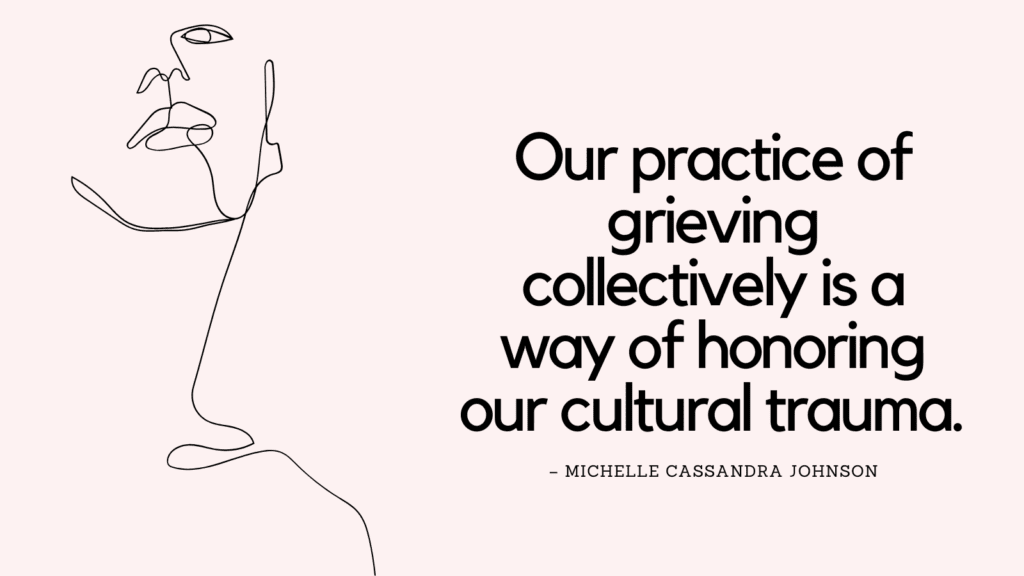This post contains some of the best collective grief quotes.
What Is Collective Grief?
Collective grief happens when a group of people (community, village, society, etc.) experience change or loss. This might be due to war, a natural disaster, or other events that resulted in mass casualties or widespread tragedy.
Collective Grief Quotes
1. “What would it be like for us to embody a responsibility for our collective hive? What would it be like to create spaces for us to grieve what has been lost as a result of our forgetting? That we are interconnected and part of a fragile and beautiful ecosystem, shared and composed of sentient beings whose survival is as important as our own?” – Michelle Cassandra Johnson
2. “Grief does not change us…it reveals us. What will our collective grief reveal? What can be transmuted if we move through our grief with great care for the collective, like the hive? Can the grief and trauma of racism, sexism, transphobia, and other systems of dominance transmute us if we allow ourselves to truly touch into that grief and hold one another through it? Can we repair across lines of power and privilege, offer reparations, attend to truth and reconciliation, and center love?” – Michelle Cassandra Johnson
3. “In my experience, white Western culture is unsure about how to give attention to grief and loss. And when there is a focus on grief, it is usually focused on an individual’s loss—not the loss we are experiencing as a culture and collective.” – Michelle Cassandra Johnson
4. “To respond to the grief that we experience as a collective, we need to be present to what is breaking our hearts. We need a spiritual practice to hold and allow us to feel grounded as we begin to recognize our brokenheartedness.” – Michelle Cassandra Johnson
5. “COLLECTIVE GRIEF. Grief felt by the collective in response to loss that affects us all such as war, a pandemic, oppressive policies, historical trauma, and systemic oppression. ” – Michelle Cassandra Johnson
Related: Best +30 Grief Activities For Adults (+FREE Worksheets PDF)
6. “Spiritual practice is designed for us to see things as they are, which means we must see, sense, and feel collective suffering, understand how we might be perpetuating suffering, recognize when we stay silent when we know the causes of suffering, and work to break toxic patterns to truly heal.” – Michelle Cassandra Johnson
7. “Our practice of grieving collectively is a way of honoring our cultural trauma.” – Michelle Cassandra Johnson
8. “Making space to acknowledge and honor our collective grief isn’t a new practice. Many cultures have engaged in rituals focused on collective grief. Dominant culture has made some of us forget our lineages, rituals, and practices centered around grief. To heal, we must grieve what we have lost due to systems of oppression, the horrific nature of dominant culture, and the suffering it creates for us all.” – Michelle Cassandra Johnson
9. “The deep work of acknowledging the collective losses we have experienced isn’t easy work. It is work we must do anyway. We must do this work to heal individually and collectively.” – Michelle Cassandra Johnson
Related: Best 21 Grief Journaling Prompts (+FREE Grief Worksheets PDF)
10. “Collective grief is what is experienced by communities when their sense of safety is challenged or stripped away.” – Michelle Cassandra Johnson
11. “The collective grief that arises from marginalization and injustice originates from the experience of continual confrontations with oppression, like being silenced, policed, and made invisible; cultural appropriation and erasure; and the legacy of enslavement of Black bodies and colonization.” – Michelle Cassandra Johnson
12. “Your individual and our collective grief deserve to be seen, held, felt, and cared for.” – Michelle Cassandra Johnson
13. “Your heart might feel overcome with sensation while it responds to your nervous system’s ringing of alarm bells throughout your entire body as a response to the cultural trauma and collective grief that surrounds.” – Michelle Cassandra Johnson
14. “Spiritual practice asks us to go inward and begin to understand that, while we have a relationship with the external world because we are in human bodies and part of what makes up the world, a connection with our internal experience might allow us to be guided in a way that better supports our collective healing.” – Michelle Cassandra Johnson
15. “When we “remember to remember” how we came to be in this moment when we are experiencing massive amounts of loss and grieving things we never imagined having to grieve, there is a space for us to allow our collective wounds to heal. ” – Michelle Cassandra Johnson
Related: Grief Comes In Waves: Top 12 Lessons From Grief No One Talks About

Does Grief Make Us Stronger?
While it is true that some individuals may experience personal growth or an increased sense of resilience as a result of their grief, it is not necessarily a universal outcome.
Grief can be an incredibly challenging and painful experience, and it affects everyone differently.
Some people may find that they develop greater emotional strength, empathy, or personal insights through their grief journey. They may also learn to appreciate life more, reevaluate their priorities, or form deeper connections with others.
However, it’s important to recognize that not everyone experiences this type of growth.
Grief can also lead to feelings of vulnerability, sadness, and a sense of disconnection from the world.
The impact of grief on an individual’s emotional well-being can vary greatly depending on various factors such as their support system, coping mechanisms, and the nature of the loss.
It’s crucial to approach grief with self-compassion and allow yourself to grieve in your own unique way.
References
- Portions of this article were adapted from the book Finding Refuge, © 2021 by Michelle Cassandra Johnson. All rights reserved.



